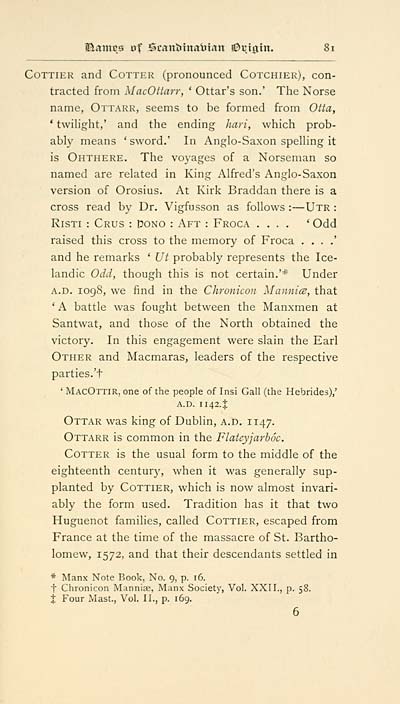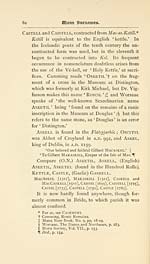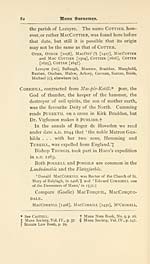Download files
Complete book:
Individual page:
Thumbnail gallery: Grid view | List view

Cottier and Cotter (pronounced Cotchier), con-
tracted from MacOttarr, ' Ottar's son.' The Norse
name, Ottarr, seems to be formed from Otta,
* twilight,' and the ending havi, which prob-
ably means ' sword.' In Anglo-Saxon spelling it
is Ohthere. The voyages of a Norseman so
named are related in King Alfred's Anglo-Saxon
version of Orosius. At Kirk Braddan there is a
cross read by Dr. Vigfusson as follows : — Utr :
RiSTi : Crus : pONO : Aft : Froca .... ' Odd
raised this cross to the memory of Froca . . . .'
and he remarks ' Ut probably represents the Ice-
landic Odd, though this is not certain.'* Under
A.D. 1098, we find in the Chronicon Mannice, that
* A battle was fought between the Manxmen at
Santwat, and those of the North obtained the
victory. In this engagement were slain the Earl
Other and Macmaras, leaders of the respective
parties. 't
' MacOttir, one of the people of Insi Gall (the Hebrides),'
A.D. 1 142. J
Ottar was king of Dublin, a.d. 1147.
Ottarr is common in the FlateyjarbSc.
Cotter is the usual form to the middle of the
eighteenth century, when it was generally sup-
planted by Cottier, which is now almost invari-
ably the form used. Tradition has it that two
Huguenot families, called Cottier, escaped from
France at the time of the massacre of St. Bartho-
lomew, 1572, and that their descendants settled in
* Manx Note Book, No. 9, p. 16.
t Chronicon Manniae, Manx Society, Vol. XXII., p. 58.
t Four Mast., Vol. II., p. 169.
6
tracted from MacOttarr, ' Ottar's son.' The Norse
name, Ottarr, seems to be formed from Otta,
* twilight,' and the ending havi, which prob-
ably means ' sword.' In Anglo-Saxon spelling it
is Ohthere. The voyages of a Norseman so
named are related in King Alfred's Anglo-Saxon
version of Orosius. At Kirk Braddan there is a
cross read by Dr. Vigfusson as follows : — Utr :
RiSTi : Crus : pONO : Aft : Froca .... ' Odd
raised this cross to the memory of Froca . . . .'
and he remarks ' Ut probably represents the Ice-
landic Odd, though this is not certain.'* Under
A.D. 1098, we find in the Chronicon Mannice, that
* A battle was fought between the Manxmen at
Santwat, and those of the North obtained the
victory. In this engagement were slain the Earl
Other and Macmaras, leaders of the respective
parties. 't
' MacOttir, one of the people of Insi Gall (the Hebrides),'
A.D. 1 142. J
Ottar was king of Dublin, a.d. 1147.
Ottarr is common in the FlateyjarbSc.
Cotter is the usual form to the middle of the
eighteenth century, when it was generally sup-
planted by Cottier, which is now almost invari-
ably the form used. Tradition has it that two
Huguenot families, called Cottier, escaped from
France at the time of the massacre of St. Bartho-
lomew, 1572, and that their descendants settled in
* Manx Note Book, No. 9, p. 16.
t Chronicon Manniae, Manx Society, Vol. XXII., p. 58.
t Four Mast., Vol. II., p. 169.
6
Set display mode to: Large image | Transcription
Images and transcriptions on this page, including medium image downloads, may be used under the Creative Commons Attribution 4.0 International Licence unless otherwise stated. ![]()
| Early Gaelic Book Collections > Blair Collection > Surnames & place-names of the Isle of Man > (99) |
|---|
| Permanent URL | https://digital.nls.uk/82100836 |
|---|
| Description | A selection of books from a collection of more than 500 titles, mostly on religious and literary topics. Also includes some material dealing with other Celtic languages and societies. Collection created towards the end of the 19th century by Lady Evelyn Stewart Murray. |
|---|
| Description | Selected items from five 'Special and Named Printed Collections'. Includes books in Gaelic and other Celtic languages, works about the Gaels, their languages, literature, culture and history. |
|---|

